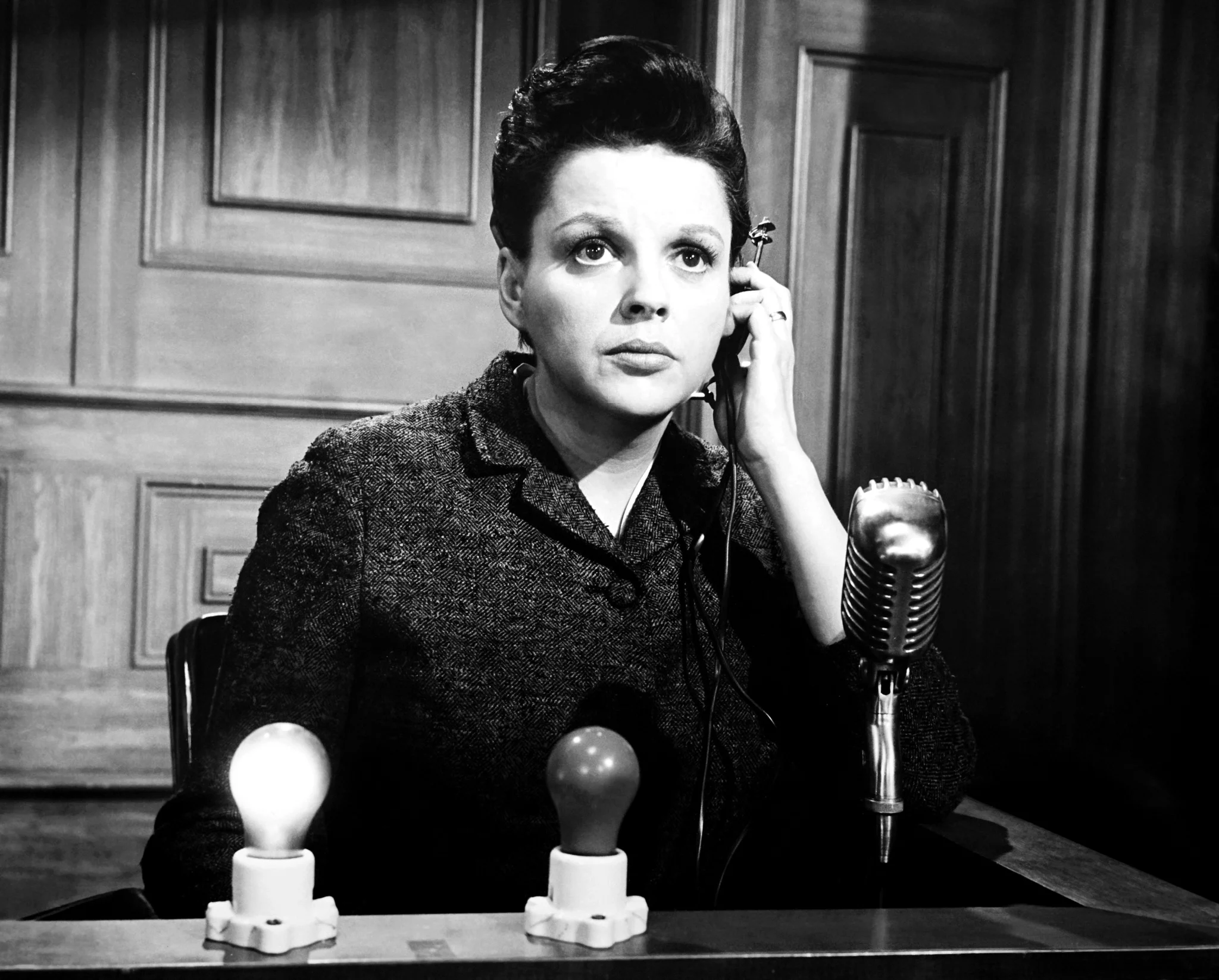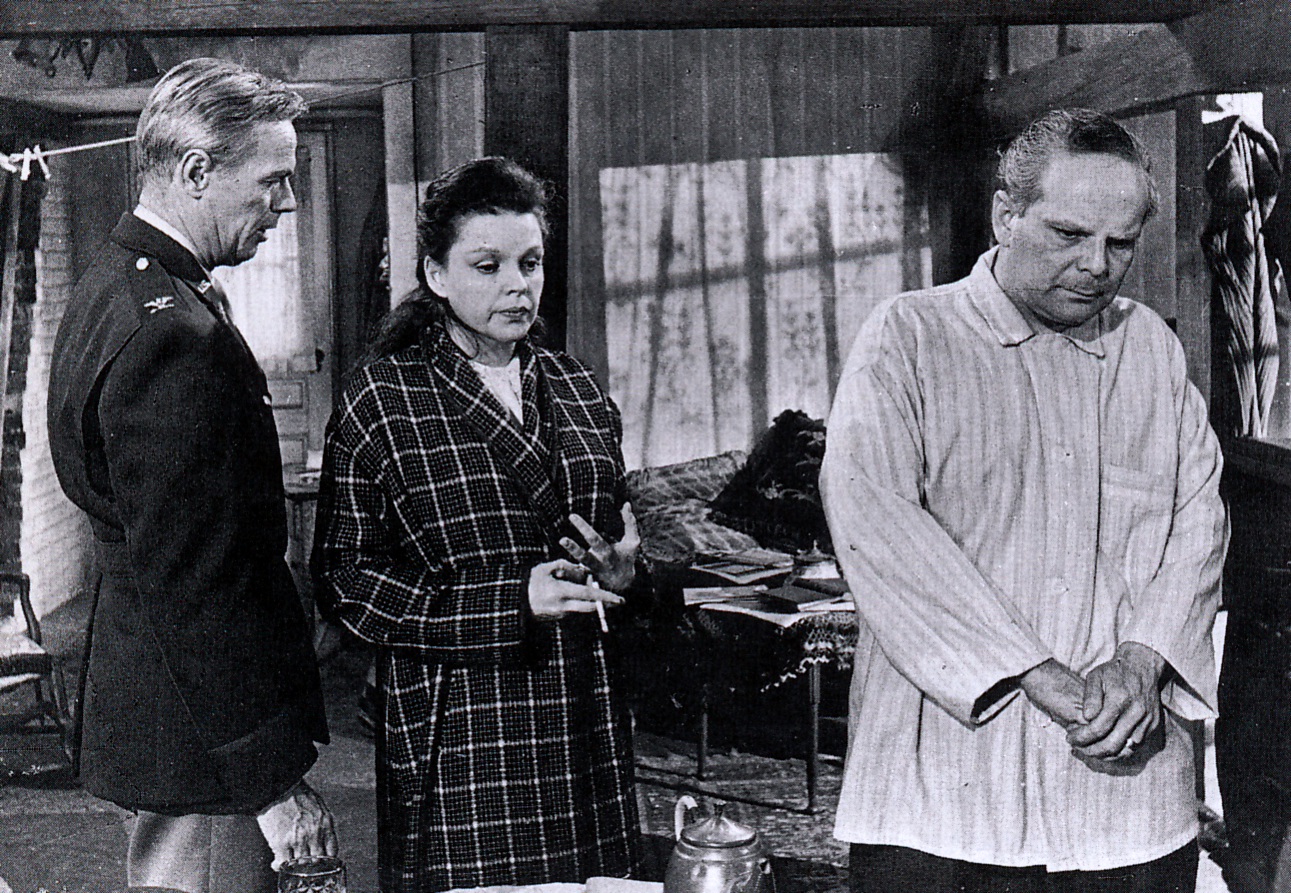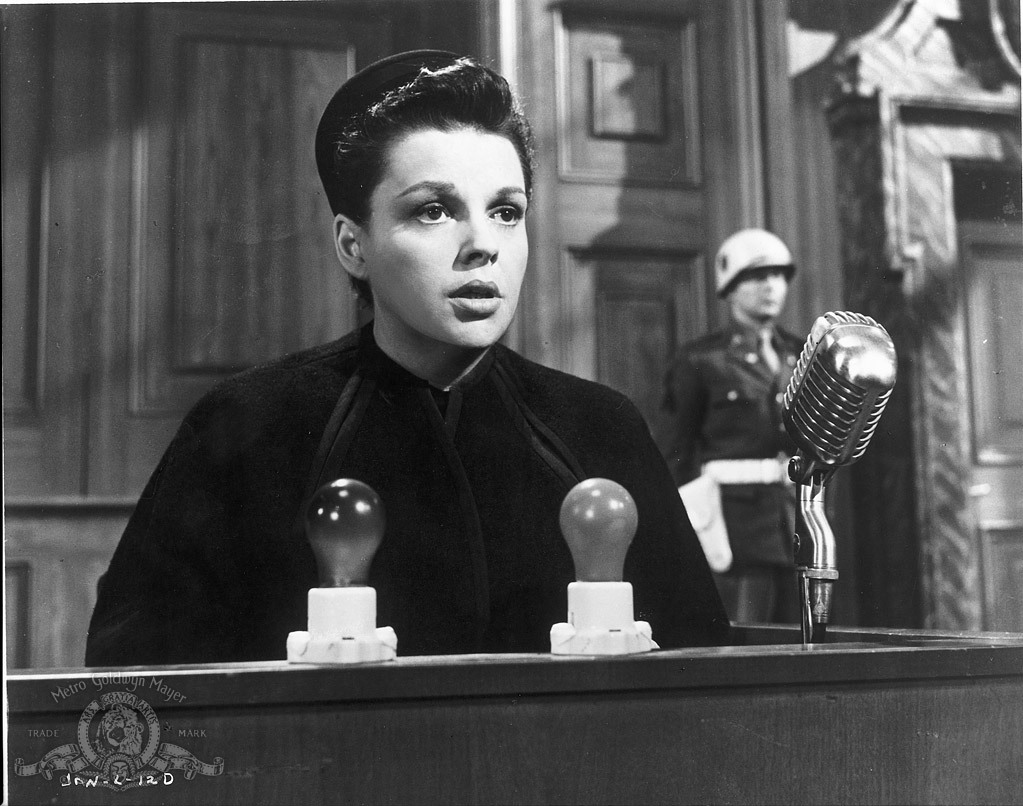Judy Garland @ 100: "Judgment at Nuremberg"
 Thursday, June 9, 2022 at 6:00PM
Thursday, June 9, 2022 at 6:00PM Team Experience is revisiting nine Judy Garland movies for her Centennial. Here's Christopher James on the star's second Oscar nomination.
 Judy Garland received a Supporting Actress nomination in 1961 for her three scene performance in "Judgment at Nuremberg."
Judy Garland received a Supporting Actress nomination in 1961 for her three scene performance in "Judgment at Nuremberg."
With a career that spanned over three decades, there were many points in which Judy Garland had to reinvent her image, intentionally or unintentionally. The other articles in this centennial celebration have examined Judy as the child star, the musical superstar and the complicated movie star. In conjunction with Claudio’s piece on A Star is Born, this later period of Garland’s career sought to deflect from her personal life through focusing on her powerful dramatic chops. Stanley Kramer’s Judgment in Nuremberg cast Garland in a new light… a supporting actress. However, her role as Irene Hoffman, a woman imprisoned as a teen for violating “racial pollution” law, is not short on fireworks. Garland delivers an impressive and affecting performance in just three short scenes. It's hard to argue against that year's winner (Rita Moreno for West Side Story), but Garland more than earns her Oscar nomination, the second and final of her career...
Judgment at Nuremberg is a three hour courtroom epic that focuses on a military court following World War II. Judge Dan Haywood (Spencer Tracy) presides over the case of a slew of German commanders who are standing trial for their atrocities committed during the Holocaust. Famous faces line both sides of the issue, including Burt Lancaster as defendant and war criminal Emil Jannings and star witnesses played by Montgomery Clift and Garland. To say the movie is stuffed is an understatement. Performing a postmortem on something as horrific and unfathomable as the Holocaust requires a lot of time and stamina, mentally and emotionally. The film hits its stride when it focuses on the personal toll of the Nazi regime, personified best by Clift and Garland.
 Garland is far from glamorous in her first scene in "Judgment at Nuremberg," the only scene that shows Irene's interior life.Garland’s entrance isn’t much of a star entrance. She slinks into her own home to comfort her emotional husband, upset and worried that his wife would have to testify. There’s tremendous empathy to her introduction. Irene cares about everyone’s feelings first - how her husband feels and also what her testimony could add to the case. It’s a soft lull compared to what is to come when she actually takes the stand.
Garland is far from glamorous in her first scene in "Judgment at Nuremberg," the only scene that shows Irene's interior life.Garland’s entrance isn’t much of a star entrance. She slinks into her own home to comfort her emotional husband, upset and worried that his wife would have to testify. There’s tremendous empathy to her introduction. Irene cares about everyone’s feelings first - how her husband feels and also what her testimony could add to the case. It’s a soft lull compared to what is to come when she actually takes the stand.
You can’t watch Judy Garland perform and not see Judy Garland. That’s a gift more than a limitation, she was a one-of-a-kind talent after all. Judgment at Nuremberg works specifically because of stunt casting like Judy Garland. On paper, Kramer’s courtroom drama is a three hour meal that goes down slow and without flavor. But Spencer Tracy’s American Chief Judge Dan Haywood presides over a monologue competition, where each actor recounts a different atrocity committed by Hilter and the Nazis during the Holocaust. Pivotal supporting performances from Golden Age actors give the film the flavor and flair it needs to sustain an audience’s interest. Marlene Deitrich’s face and voice immediately conjures up the image of an elusive German beauty who may or may not be trusted. When Montgomery Clift takes the witness stand as a worker who was forcibly sterilized, one can’t help but marvel at Clift’s scarred face and think of the actor’s own troubles.
By that end, Garland’s own persona helps inform the testimony that her character, Irene Hoffman, gives in the trial. She recounts being on trial as a teen for breaking Germany’s “racial pollution” law, which forbade sexual relations between Aryan and non-Aryan people. As she gives her testimony, the audience places teen superstar Garland in the position of the on-trial Hoffman. It’s a smart use of an actor’s persona and history to elevate the already strong and affecting monologue they are given.
 Garland astounds with her vulnerability in her final interrogation on the stand against Oscar winner Maximilian Schell.
Garland astounds with her vulnerability in her final interrogation on the stand against Oscar winner Maximilian Schell.
Garland’s final testimony is powerful but not because she cries and yells back. Her palpable vulnerability is tough to watch, but even harder to look away from. Courtroom scenes offer actors the perfect opportunity for a dramatic tennis match of emoting. While Clift’s Rudolph Peterson fights back against his questioner, Garland’s Irene takes a different approach. Maximilian Schell’s defense attorney, Oscar Rolfe, senses Irene’s fragility and decides to scream and grandstand more, torturing her with details. Tears stream down Irene’s face as she breaks down. She’s a woman re-traumatized. Her worst fears have come to roost, she has to relive the details of the worst day of her life.
Schell won Best Actor for his work in Judgment at Nuremberg, and his scene opposite Garland is perhaps the showiest moment of his performance. The film is a terrific example of how, even in the last act of her life, Garland possessed incredibly dexterous dramatic talents. Unfortunately, Garland passed away eight years after the release of Judgment at Nuremberg. Still, as this centennial celebration proves, Garland left behind a rich, varied and timeless career that will live on forever.
More for Judy's Centennial here at The Film Experience



Reader Comments (4)
Schell said that while filming her final scene, Garland asked him to be tougher with her so she could feel more. She wanted to do the scene justice. And she does for all her scenes. We get the picture of a decent woman- perhaps the most decent person in the whole movie- who wants to go good, but has just been beaten down so much the energy is just dwindling.
Allegedly Rita Moreno was so sure Garland would win the Oscar that she was truly unprepared and shocked when she won and that is why her speech was so short.
Schell said that while filming her final scene, Garland asked him to be tougher with her so she could feel more. She wanted to do the scene justice. And she does for all her scenes. We get the picture of a decent woman- perhaps the most decent person in the whole movie- who wants to go good, but has just been beaten down so much the energy is just dwindling.
Allegedly Rita Moreno was so sure Garland would win the Oscar that she was truly unprepared and shocked when she won and that is why her speech was so short.
It is a shocking change of pace for her but she's up to the challenge which based on her work in Star really shouldn't have come as a surprise.
Doubtful that Judy was often the initial choice for many straight dramatic films despite her lauded work in The Clock especially after she left MGM but she was director Nunnally Johnson's first choice when The Three Faces of Eve was in its early days of planning. A very intriguing possibility with her great well of emotional variety she would have been fascinating but Zanuck well aware of her reputation and fragility turned him down.
Oddly since Joanne Woodward is so perfect in the part when he couldn't get Judy Johnson had quite a time filling the role. He next offered it to the queen of the lot-Susan Hayward who passed, a decision she later regretted, then to June Allyson who wanted to do it but her husband Dick Powell convinced her, probably correctly, she wasn’t suited to it. Then they turned to Ann Blyth who was expecting a child so declined. Followed by Eva Marie Saint-another good fit-but she turned it down because she was committed to A Hatful of Rain. Finally Fox arranged to borrow Carroll Baker from Warners but she discovered she was pregnant as well and had to withdraw at which point they turned to Woodward whom they had under contract but was unproven and relatively unknown.
In the discussion of so many of Garland’s shoulda-woulda-coulda missed opportunities, I have always dreamed the elusive Judy Garland project was the film adaptation of the Broadway musical Gypsy. Garland would have been brilliant as Mama Rose in the 1962 film with daughter Liza as Gypsy. Garland was briefly considered for the role.
Here is an album outtake from 1962 where Garland sings Some People, Mama Rose’s opening number in Gypsy.
https://www.youtube.com/watch?v=2TgiyNN12io